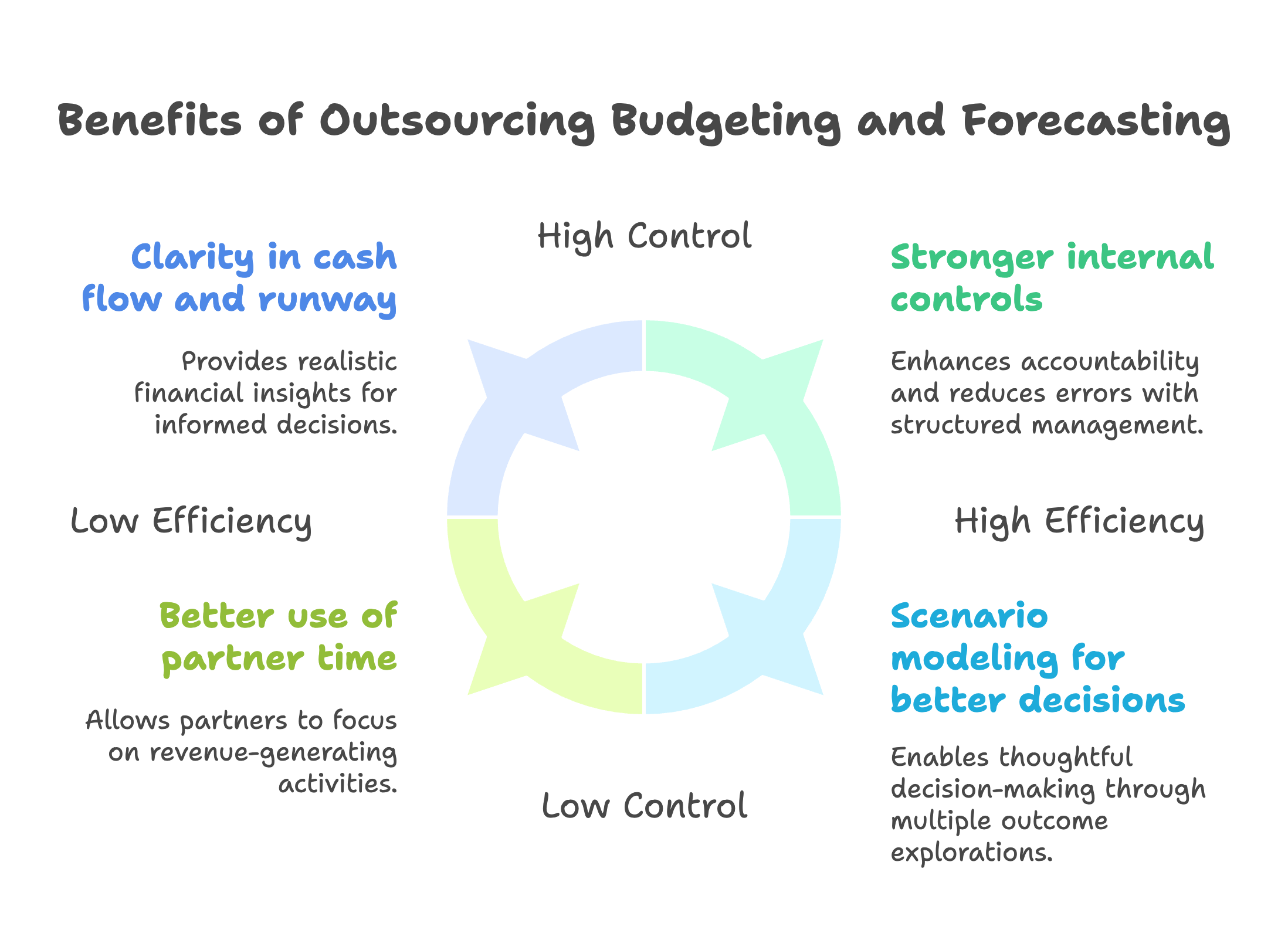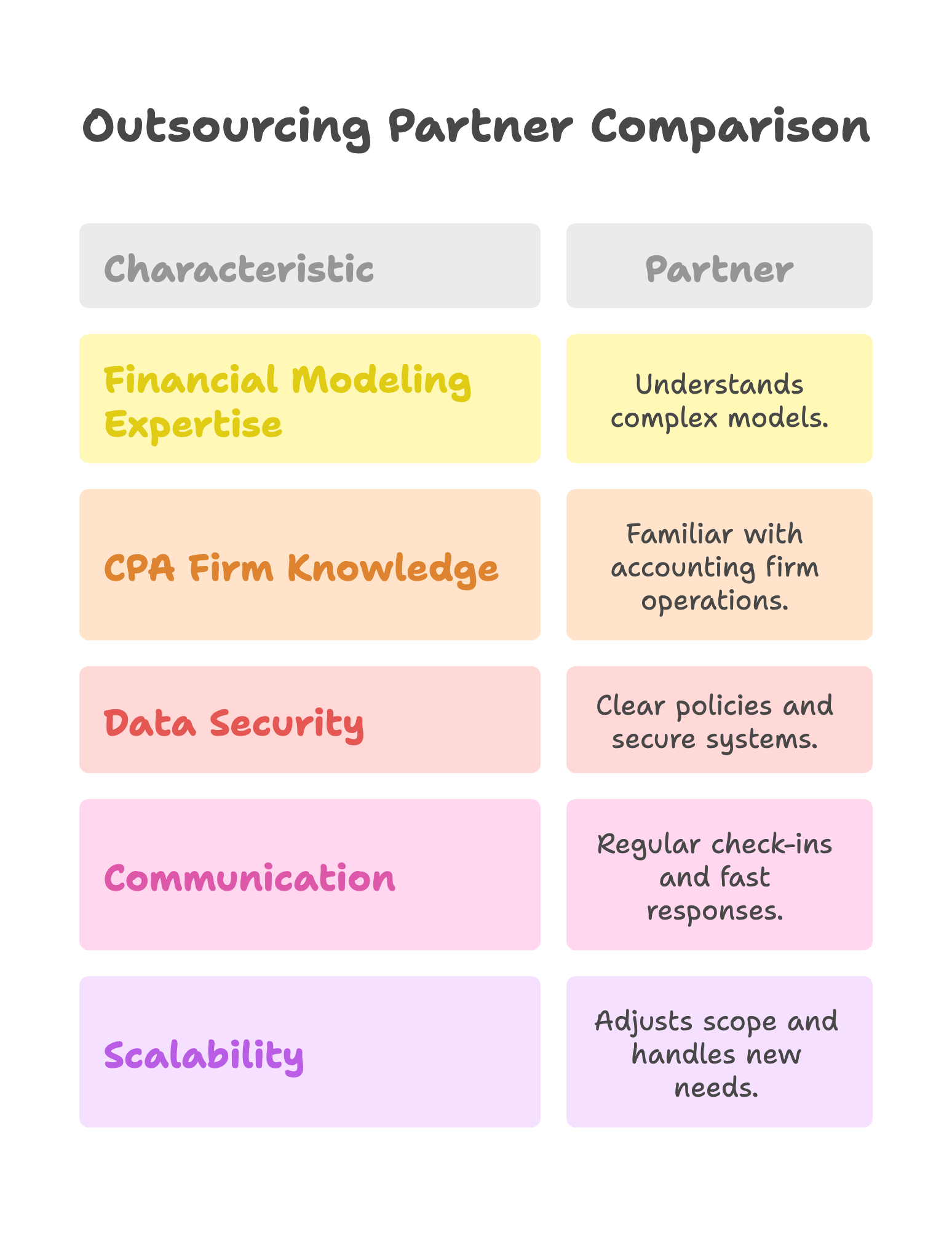Every CPA firm wants to grow. That means more clients, better margins, stronger teams, and steady cash flow. But growth without financial clarity is a gamble.
Budgeting and forecasting give firms that clarity. They help partners understand where the firm stands today, what the future might look like, and what actions will move the firm forward.
The problem is that most small and mid-sized CPA firms do not have the time or bandwidth to build and maintain structured financial plans. Internal teams are busy with client delivery. Forecasts are delayed. Budgets are outdated. And key decisions get made using gut instinct instead of data.
Outsourcing budgeting and forecasting solves this problem. With the right offshore partner, you gain updated financial models, cash flow visibility, and scenario planning support. You also save hours of time and avoid the headaches that come with managing it all in-house.
Madras Accountancy works with CPA firms across the United States to build strong financial systems through offshore support. This includes budgeting and forecasting, customized to the pace and complexity of each firm.
In this guide, we explain why budgeting and forecasting matter, where firms struggle when they try to manage these processes internally, and how outsourcing helps you move faster with fewer mistakes.
Firms make dozens of financial decisions every month. Some are small, like buying software or approving overtime. Others are bigger, like hiring, taking on new clients, or adjusting service pricing.
All of these decisions affect profitability. Without a reliable view of future income and expenses, each one becomes a guess.
Budgeting gives you a plan. Forecasting helps you adjust that plan in real time. Together, they help you:
These tools are especially important for firms with multiple service lines, variable billing models, or growth plans that require capital investment.
Good budgeting and forecasting allow you to spot problems early, fix leaks before they spread, and take advantage of opportunities without putting your cash position at risk.
Most firms attempt to manage financial planning internally. That usually means spreadsheets. Someone on the team builds a budget in January. Then the file is left untouched until December. Forecasts are only created when something goes wrong or when a bank or board member asks for one.
Here are the most common issues:
Partners and managers are focused on client delivery. Budgeting feels like an internal task that can wait. But the longer it waits, the more disconnected the numbers become from reality.
Forecasting involves more than dragging formulas in Excel. You need to know how to adjust assumptions, model headcount growth, estimate variable costs, and build what-if scenarios. Most small firms do not have someone who specializes in this.
Static spreadsheets break easily. They lack audit trails. Version control becomes a nightmare. And they do not update automatically as the business evolves. This leads to errors and missed trends.
When forecasting is done internally, teams tend to be overly optimistic or cautious. This can distort planning. Outside experts bring objective analysis based on data and experience.
A forecast that is not reviewed regularly is useless. Yet few firms have the capacity to revise projections monthly or quarterly. This results in missed warning signs and reactionary decisions.
Outsourcing this function means bringing in a dedicated external partner to manage your financial models. They take responsibility for building, updating, and maintaining your budgets and forecasts.
You provide access to your financial data. They turn it into usable insights.
This includes:
Outsourcing does not mean losing control. You still make the decisions. But now you have the data and analysis to support those decisions with confidence.
Outsourcing is not just about handing off work. It is about gaining better systems, clearer data, and more informed decision-making. Here is how firms benefit.
Outsourced forecasting helps you understand how much money will come in, what is going out, and how long your firm can sustain operations under different scenarios. This is especially useful when evaluating whether to hire, invest in tools, or expand into a new service.
You get a realistic picture of your cash position, which reduces guesswork and improves confidence in your day-to-day decisions.
When a structured external team manages your forecasts and budgets, you gain an added layer of accountability. There is less room for error or manipulation. Each report is built on clean data and verified assumptions.
This improves internal controls and provides better audit trails, which is especially helpful if you are preparing for external financing or acquisition discussions.
Financial planning is important, but it should not take partners away from revenue-generating work. By outsourcing these functions, partners can focus on clients, team leadership, and strategy. The offshore team does the research, modeling, and reporting. You review and approve the outputs.
This division of labor is more efficient, more accurate, and more scalable.
A good outsourced team will not just give you one forecast. They will help you explore multiple outcomes. For example:
Each scenario helps you test assumptions before you commit. This makes your decisions more thoughtful and less reactive.
With outsourcing, you can run forecasts monthly or quarterly without disrupting your team’s focus. You always have an up-to-date view of financial health, which keeps you better prepared for board meetings, tax planning, and client discussions.

Not all providers are the same. Budgeting and forecasting require attention to detail, financial knowledge, and the ability to understand your business model. Here is what a good partner should offer.
They should understand how to build and maintain complex models. This includes revenue projections, cost assumptions, headcount planning, margin tracking, and more. Ask what tools they use and whether they build models from scratch or rely on templates.
The best partner will understand how accounting firms work. That means familiarity with billable hours, project-based billing, seasonal revenue trends, and compliance costs. Without that context, the numbers may look correct but still be unhelpful for your decisions.
You will be sharing sensitive financial information. Make sure your partner has clear data privacy policies, secure systems, and limited access protocols. Compliance with U.S. data standards is non-negotiable.
Outsourced work only succeeds with good communication. Your partner should offer regular check-ins, fast responses, and clear timelines. Look for teams that use project management tools and provide direct points of contact.
As your firm grows, your forecasting needs will change. Your partner should be able to adjust scope, handle new reporting needs, or scale up support during peak planning periods. Flexibility is key to a long-term partnership.

Outsourcing is not just for large firms. In fact, smaller firms often see the biggest gains because they have the most to lose from poor planning. Here are a few examples of when outsourcing makes the most sense.
If you are adding tax advisory, CFO services, or audit offerings, your financial model will change. An outsourced team can help you project revenue and cost impacts more accurately.
Hiring decisions affect profitability. Forecasts help you plan for onboarding, training costs, and time to full productivity. This prevents over-hiring or under-staffing.
Lenders, investors, or potential buyers will want to see clean forecasts. Outsourced teams can prepare documentation that aligns with what stakeholders expect.
If your current spreadsheets are constantly changing or hard to understand, that is a risk. Outsourcing brings structure and consistency.
If you are only planning when something breaks, it is time to switch gears. Regular forecasting helps you lead with intention instead of reacting under pressure.
At Madras Accountancy, we support U.S.-based CPA firms with end-to-end financial planning support. Budgeting and forecasting are two of our core services. Here is how our process works.
We start by understanding your firm’s revenue model, cost structure, service offerings, and goals. We also review past budgets, if available, to identify gaps and opportunities.
Next, we pull historical data from your accounting software, spreadsheets, and payroll records. We ensure accuracy, remove inconsistencies, and organize the data for analysis.
We build a baseline budget and forecast using rolling twelve-month models. This includes variable revenue assumptions, headcount planning, margin analysis, and expense tracking.
We work with you to identify key what-if questions and build scenarios for each one. This may include different hiring plans, price changes, or project load assumptions.
Each month or quarter, we update the models using actual performance data. We prepare reports showing variances, trends, and recommendations.
You receive structured reports with key takeaways, charts, and discussion points. We also provide ongoing access for real-time visibility.
The result is simple. You make better decisions. Your team spends less time on spreadsheets. And your firm runs with more predictability.
Ask yourself the following:
If you answered yes to even two of these, outsourcing may be your next smart move.
Budgeting and forecasting are not just financial routines. They are the backbone of every good decision a CPA firm makes. Without reliable data, your team is forced to guess, react, and hope for the best. That is no way to grow a firm.
By outsourcing these functions, you gain structured planning, better cash flow control, and freedom for your team to focus on what matters. The right partner brings tools, expertise, and consistency that most internal teams cannot provide.
Madras Accountancy supports small and mid-sized CPA firms with offshore budgeting and forecasting that fits your workflow, timeline, and goals. If you are ready to replace guesswork with strategy, our team is ready to help.

A practical comparison of hiring a freelancer vs using a dedicated offshore accounting team, focusing on continuity, quality control, security, and scaling.

How CPA firms outsource payroll and 1099 work to reduce penalties and admin load, with a clean workflow for approvals, filings, and year-end reporting.

Practical do's and don'ts for CPA firms outsourcing accounting work, based on common failure points and what successful rollouts do differently.